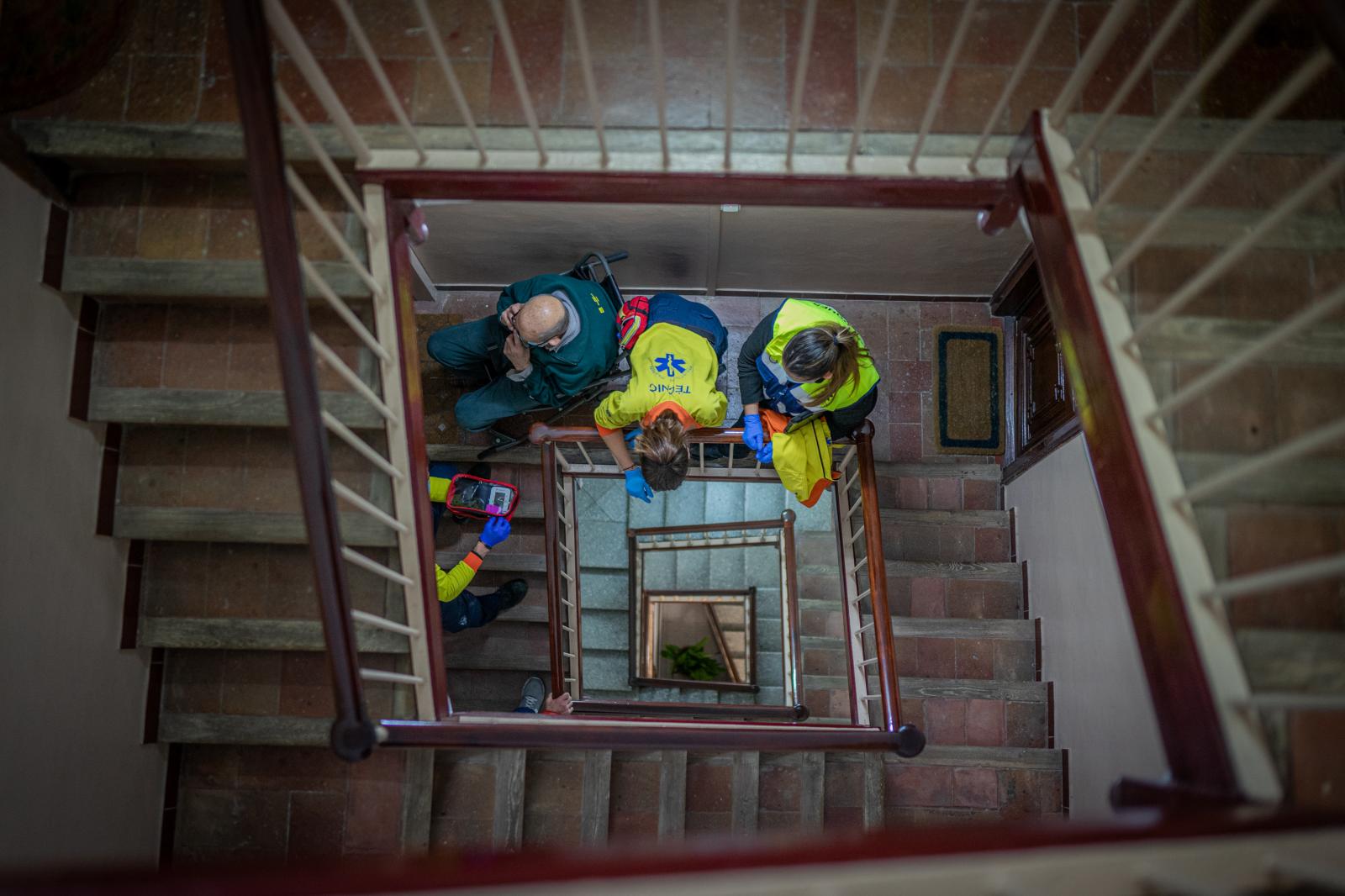Growing old in times of pandemic
The elderly are one of the groups most affected by the pandemic. Many of them suffer from great loneliness.
Last November 19, Joan Clupés (84), broke his femur when he fell while working in a small workshop he has on the roof of the building where he lives, in the Gràcia neighborhood. It is a first floor without a lift (56 steps). He lives alone, but his brother and sister-in-law, Lluís and Eulàlia, live upstairs. They, in fact, were the ones who were able to quickly call the ambulance.
The paramedics lower him with difficulty from the roof to the street in a wheelchair by a narrow and complicated staircase. While they are taking him down, Joan is thinking about what will become of him. Nothing important has ever happened to him. He has always had iron health and this is coming to him again. Once in the ambulance, they take him to Hospital de Sant Pau.
They operated on him on the morning of the 20th, the day after arriving at the hospital. The operation is a first step towards returning to your old life, a normal and peaceful life, but with the autonomy that health always gives us, both physically and mentally. "See that canvas over there? Every time I see her I imagine she is a rubella". In the room, unable to move, the window becomes a viewing window, a substitute for the television. This allows him to remain connected to reality. Despite the calls, the good treatment of the health staff and the few visits that the restrictions allow, Joan is sad and worried, knowing that his new path is just beginning.
While he is recovering from the operation, the family is looking for a socio-health center where he can rehabilitate. At home, with many obstacles, it is impossible for him (he has no lift or shower tray). The goal is for Joan to be able to smell the walls of his house again when he is fully recovered. Finally, the family chooses the Blauclínic Dolors Aleu center, in Plaça Lesseps.
It enters on November 25. There, Joan begins to see the light at the end of the tunnel and her mood turns like a sock. His new roommate, José, helps him a lot, with whom he shares eternal moments and conversations on the terrace, about cooking, music and cinema, among others. José becomes his friend and confidant, with whom to spend hours and express feelings. "Today I see you well, Juan. You have to be happy", says José. "If this hadn't happened to me, I wouldn't have met José," he says, smiling.
Joan is more positive every day, although she is now aware that she will not be able to spend Christmas at home. In Dolors Aleu, he begins to take his first steps with a walker, he recovers in the mornings with Artur, one of the centre's physiotherapists. He does the exercises with him but talks about everything, basically, to try to connect with the outside world.
"I've gotten used to having these toasts for breakfast that they bring me every morning and I think that's good." The little details help you get ahead. The days, however, have no surprises. Joan has breakfast, recovers with Artur, sunbathes on the terrace, and receives a visit from 12-2pm from his son David. To break the monotony, Joan takes care of the plants on the central terrace, and even plants some cuttings. Meanwhile, an important day arrives: the change from the walker to the crutches.
Saying goodbye to his roommate and friend José, who was discharged two weeks earlier, is a small blow to his spirits. However, on January 7, the awaited moment arrives: his discharge. It's time to say goodbye to the nurses, the physiotherapists, the patients with whom I used to play dominoes and the rest of the staff. People often forget that a residence or social health center not only heals, but also creates bonds, listens, talks and gives years of life to those who know how to take advantage of it. Joan knows this, and for that he is grateful. Before leaving the center for good, he decides to write a memoir evaluating the good treatment he received.
With David, and with everything ready, they wait in the room for the ambulance to come to take him home. "David, it's taking too long", Joan is impatient. After a few minutes of nerves because of the delay of the ambulance, it finally arrives. His face is now one of satisfaction.
After a ten-minute journey looking at the neighborhood streets with a smile, Joan arrives home, says goodbye to the ambulance and takes out the keys. Father and son enter, happy that everything went well and that now Joan can be at home again. Full of excitement, he climbs the steps, helped by the railing and a crutch. As he moves forward, he hears Lluís and Eulàlia, who are waiting for him in their flat, with the door open. Meanwhile, David picks up his suitcase. At the entrance, he hugs his brothers-in-law and sheds a few restrained tears. "Thank you very much for everything", he says."You would have done it too", replies Eulàlia. They all enter the house. Twelfth Night gifts await him on the table, despite being aware that the best gift is to have been able to feel the warmth of his home again.
Now he continues to recover at home, with the desire to resume contact with José and to continue valuing his health and the people around him. At a time when loneliness is claiming many more lives due to the pandemic, company is very important. The coronavirus kills now. Loneliness has killed and will always kill.

